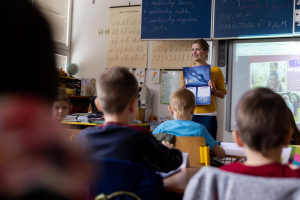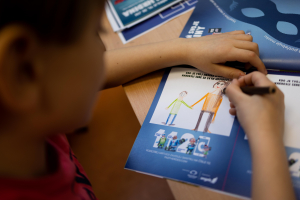FAST heroes are coming to Czech schools. Together with children and their grandparents they will learn how to fight against stroke.
Schoolchildren in the Czech Republic have the opportunity to take part in the global experiential learning programme Heroes FAST, which aims to teach children to recognise the signs of stroke and to be able to call for help immediately. The project has been successfully implemented in 37 countries around the world.
Together we can save the world – one grandparent at a time.
Stroke or stroke or ictus is the second leading cause of death, the third leading cause of disability and one of the main reasons why children lose their grandparents. “The sad reality is that many stroke patients cannot be treated because they arrive at the hospital too late. People can survive and go on living without consequences if they receive prompt, quality and effective care. This is why it is important to spread awareness of the most common symptoms of this disease and to teach children that they need to call for help as soon as possible,” explains neurologist Hana Paloušková from Karviná Mining Hospital, who is one of the expert guarantors of the project.
According to a study by the World Stroke Organisation (WSO), every 30 minutes a stroke patient who could be saved dies or has permanent consequences. The study showed that up to 80% of stroke patients did not recognise their symptoms as stroke symptoms. These people did not think their condition was so serious that they needed to act quickly. The only way to know that someone is having a stroke is to be able to recognise the most common symptoms and, if they appear suddenly, to call an ambulance immediately.
The symptoms are summarised in the acronym FAST, which is easy to remember and stands for F for face, A for arm, S for speech, and T for time, which tells us not to wait and call an ambulance immediately, the patient is concerned about time.
“The content of the FAST Heroes educational program is based on animated characters. Its central figure, a boy we have given the Czech name Časomil (Timmy the Time), becomes a FAST hero after he learns how to defeat an evil blood clot and saves the lives of the great heroes, his grandparents. The other heroes of the FAST campaign are animated characters who also remind children of the most common symptoms of stroke: Tvářil Veselý (Franc the Face), Ručoun Silný (Armando the Arms), Mluvílika Zpěvavá (Sophia the Singer), and Táňa the Teacher, who guides the children through the lessons,” says project coordinator Renata Hejnová from the St. Anne’s University Hospital in Brno, whose role is to help schools implement the campaign in the classroom.
The fun five-week engaging and interactive educational programme is primarily aimed at children aged 5-9. It teaches children empathy and love, as well as providing them with practical, life-saving skills. The educational program can be implemented in the classroom or in a daycare setting. Children are equipped with tools to help them accomplish their mission, which is to educate grandparents. Educational materials include short animated films, classroom activities, and take-home materials that help children deliver the message literally to their homes.
The educational programme is open to the child, the whole class, the school or the teacher by logging on to the website, which is available in Czech at www.fastheroes.com.
One of the first representatives of the medical community to join the project is Svatopluk Ostrý, the head of the neurology department at the České Budějovice Hospital. I tried it with my children, who really enjoyed it. Even my colleagues’ children really like the programme. I am glad to be part of such an attractive project. I think the graphic design is a strong point of the project and the schools will like it.”
The first school that has joined the project and has already tried the educational programme in the classroom is the primary school on Tuháčkova Street in Brno. The school has previously been involved in the HOBIT educational programme, which is the older brother of the Heroes FAST project and also teaches pupils to recognise the signs of stroke and heart attack, and is aimed at second-grade pupils. “Based on our good experience with the HOBIT programme, we were happy to join a similar project aimed at our youngest pupils,” explains the school’s head teacher Jana Hanáková.
The Heroes of FAST campaign was developed by the Department of Educational and Social Policy of the University of Macedonia in Greece, together with the ANGELS Initiative supporting the improvement of care for stroke patients. The Heroes of FAST campaign is sponsored by the World Stroke Organization (WSO).
In the Czech Republic, the project is implemented by the Health Management Institute in collaboration with the Stroke team of the International Centre for Clinical Research, a joint facility of St. Anne’s University Hospital in Brno and Masaryk University Faculty of Medicine, the Hospital in České Budějovice, a.s. and Karviná Mining Hospital, a.s. with the support of the Cerebrovascular Section of the Czech Neurological Society of the Czech Medical Society of Jan Evangelista Purkyně.
“We hope that other hospitals and organisations will join the campaign and participate in the coordination of the whole mission,” says Veronika Svobodová on behalf of the Health Management Institute. “Creating a network of enthusiastic collaborating doctors, nurses and other professionals, as well as medical students or medical educators, is one of the building blocks for the successful implementation of the project and the spread of the Heroes of FAST campaign,” Svobodová adds.
We recommend following the website: www.fastheroes.com



